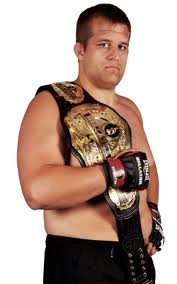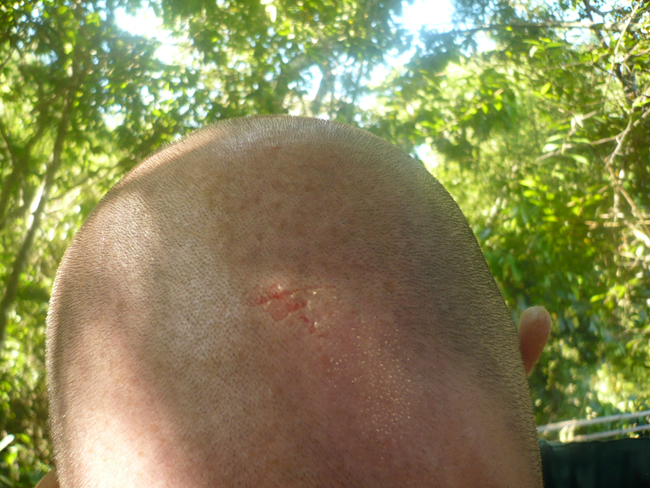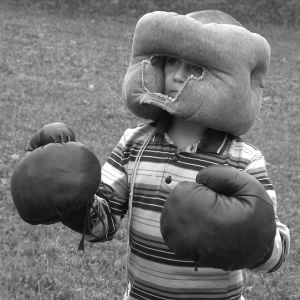The guys at the top of the boxing and mixed martial arts world’s make a lot of money. Guys like Floyd Mayweather and Manny Pacquiao make millions every time they step into a boxing ring. Likewise, Georges St Pierre, Anderson Silva and Jon Jones are making millions every year from fighting in the UFC.
Things aren’t so great for the vast majority of fighters. Even in the UFC, the guys who are fighting in the preliminary fights (which are shown the PPV event) are only making between $5,000 and $12,000 per fight. They can make a little more through sponsorship however, when you consider they usually only fighter twice a year, it’s not exactly a great living. Particularly when you take into consideration all their other costs: gym fees, fight coaches, agents etc.
Boxing has historically bred champions from impoverished backgrounds. Poverty and adversity turns a lot of people to boxing. For many, boxing is a route to a better life. I have lost count of the number of professional boxers have stated in interviews that if it wasn’t for boxing, they would be dead or in jail.
Mixed Martial Arts fighters are a little different. There is a much higher percentage of people who turn to MMA who come from educated backgrounds. This is perhaps why many MMA fighters are thinking twice about fighting as a career. Mike Chiappetta published a great article about this yesterday entitled “For many young fighters, retirement calls early“.
The article talks about how many top fighters are retiring in their late twenties or early thirties. Most of these fighters are not fighting for belts, however they are very accomplished fighters who have fought in the top tier organisations (e.g. UFC, Bellator). The fighters have cited a variety of reasons of retiring. Money seems to be a main concern for many.

American MMA fighter Cole Konrad retired last year. He only fought twice in the space of two years.
“When I was weighing the opportunity I was given vs. fighting, I had to face the reality that fighting is a pretty dead-end job,” he said. “Am I going to be 35 or 40 and still fighting? Then where do I go when I’m done, when I’ve never had a real job? Was I going to make as much money where I would be able to retire at that age? It’s possible. But the reality is, given my physique, I didn’t see that happening. However you want to look at it, that definitely plays a part. You have to look the part, act the part, be the part to cash big checks. I was pretty successful fighting, but in other aspects I wasn’t exactly what was being sought for a high-profile fighter.”
If you haven’t heard about Cole Konrad before, his story might sound like a washed up fighter in their late 30’s who is struggling to make a living. This is not the case. Cole announced his retirement at the age of 28. It’s not like he was a mid-tier fighter either. He finished his career undefeated with 9 wins and 0 losses. He was the first Bellator Heavyweight Champion. Since retiring last September, he has been recruited as an agricultural commodities trader.
Many fighters have cited the time that it takes to be a professional. Tom DeBlass won 7 in a row but then lost 2 fights in the UFC. He knew then what he had to do to become a top fighter, but it meant spending huge amounts of time away from his family.
What is perhaps more interesting is that many MMA fighters are looking at the long term health problems that can arise from fighting for a living. Canadian MMA fighter Nick Denis retired in November, after turning 29. He had an impressive record of 11 wins and 3 losses; going 1 and 1 in the UFC.
He retired due to his concerns about chronic traumatic encephalopathy, the degenerative disease that has long been associated with boxers and American football players. It is caused by head injuries and concussions.
Nick wrote an article on his blog explaining his reasons for retiring:
After my first loss, a devastating knockout where Marlon Sandro dribbled my head on the canvas like a basketball, I did lots of research on concussions. As a graduate student at the university of Ottawa, I had access to all peer reviewed scientific journals. No surprise to find that concussions = bad. However, I found something that had never occurred to me. Sub-concussive trauma. Basically, a blow to the head that doesn’t lead to a concussion. When it happens, you feel fine, and continue on. Maybe you feel like you just had a little brain scramble, nothing big. Those who spar, know what I am talking about. However these add up. They accumulate, from training session to training session, year after year. The research papers found that men who never had an actual concussion, rather only sub-concussive trauma, (they used football/hockey players) when brain scans were administered to them (can’t remember if it was mri or ct), their brain morphology was decayed like that of individuals with later stages of neurodegenerative disorders.
I told myself that if I suffered one more concussion, whether it was in training, in a fight, or just slipped and fell outside on ice, that I was going to be done fighting. Well, over 3 years later, and I haven’t suffered a concussion. I told my best friend Nick, while climbing a never ending mountain in Petra a few months ago, before I made my decision to retire, that I hope one day I will get knocked out again. Funny, I know, but it would give me a sign of a definitive concussion. I would know for sure, decisively, and be able to follow my own rule and retire. But what if I never do get knocked out again? What if for the next decade I keep training hard and competing. I get in ‘wars’ and receive tons and tons of sub-concussive blows. Wouldn’t that be orders of magnitude worse than one concussion?
In the last couple years, and especially in the last few months leading up to my May 5th fight, while sparring I would notice that when I got hit, it would affect me more and more. When I first started sparring I would run through punches unaffected. Not only that, but now training at Tristar, I am literally training with the world’s best. We are all training at the highest level, all for the same reasons. Could I fight in the UFC, against the best fighters in our solar system, literally trained killers, without sparring in training? Not really, so what was I to do? I have made the decision to retire.
Some might judge, but that is fine. Maybe I have already suffered brain injury, maybe I never would have. That is the problem with the brain. You can’t really see the injury, it will take years and decades to manifest itself. When you get rocked in sparring, you shake your head and regain your composure, and within 10 seconds say ‘ok, I’m good let’s keep going.’ But are you actually ok? You are no longer dizzy, true, but do you have any idea what physical trauma your brain has just experienced? I have told this to a few people before. I make the analogy of my love for MMA as being a drug addict – I know that it isn’t healthy for me, but holy fuck do I love it. I love MMA, and I have loved my experience with the UFC, Sengoku, and every other promotion along the way, but I am a human being first. I don’t define myself by my work, and nor should you. I am a human being, and I was born with only one brain, and I want to take care of it so that I will recognize the ones I love when I get older.
I love watching MMA. When a big UFC event comes up I watch all the pre-fight interviews and articles. After watching the event, I then watch all the post-fight interviews, news and articles. For me, it’s the most exciting sport to watch, perhaps due to me training in Taekwondo, Muay Thai and BJJ etc.
I have nothing but respect for anyone who steps into a ring to fight. I know from my own limited experience from Taekwondo tournaments how stressful it can be for fighters going into a fight (not comparing myself to those who fight in front of thousands/millions, but I can relate to what they are going through). They work hard to get to the top.
I do have a lot of admiration for fighters like Nick Denis, who are taking a look at the long term problems that can arise from fighting for a living. I have had some heavy sparring sessions myself in the past in which I took a lot of heavy knocks.
Recently, whilst visiting the Argentinian side of Iguazu falls, I suffered a concussion. I would love to tell you all that I got it from saving an old lady from being attacked by 5 angry robbers. The truth is, me and my girlfriend were walking along and I just felt a bang on my head. Branches from the surrounding trees would stick out into the path, and I had inadvertently walked into a really thick branch.
The picture below was taken shortly after it happened. It doesn’t look that bad…in fact, it looks like just a little grazing. I can assure you, it caused me more pain that other injuries in the past that looked more painful.

I didn’t get knocked out, however I did have to sit down for a while. I felt awful….truly awful. I felt sick and really confused; finding it difficult to think or concentrate on anything. Years ago I had suffered a mild concussion so I knew what it was I was experiencing. This was actually much worse than anything I had ever suffered from fighting. After the third day of suffering from these symptoms, I advised my girlfriend that I was going to go to the hospital the next day. However, the following day I felt a little better, and the problems slowly disappeared.
Head injuries scare me. I have had blackouts before because of drinking too much, and I have been caught with some hard punches and kicks in Taekwondo training that made me see stars. I’m fully aware that head injuries can cause depression, dementia and Parkinson’s disease later in life…..or even worse.
So, for someone who has only had a few knocks due to training (or my own stupidity!), I can understand the fears that many MMA fighters have, as they are getting hurt every week. Professional fighters are treated by gods by many…but at what price does that come?
It makes me understand why fighters such as Lyoto Machida and Anderson Silva try not to get involved in wars. Whilst the recent brawl between Wanderlei Silva and Brian Stann was amazing to watch, I can’t help but wonder what long term damage these guys will suffer from fights like this.
Many people agree that the long term damage of boxing and American football is worse than MMA. I’m not sure whether this is true or not. The reasons given for MMA being less dangerous sound reasonable, however modern MMA is only 20 years old. We should start seeing the long term effects of fighting MMA for a living in 20 or 30 years.
I would love to hear from those of you who do train in martial arts or boxing regularly, or those of you who knows someone who does. Please leave a comment if you have time :)
Thanks for reading.
Kevin

